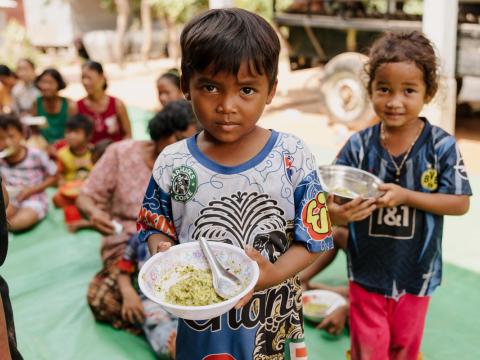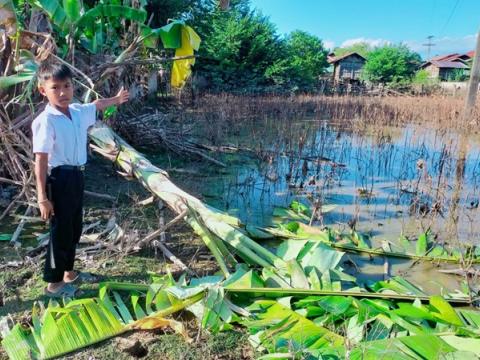
Let's have faith in religions' power to protect the planet for children
In the run-up to Earth Day environmental expert, Aaron Tanner, and Faith and Development Advisor, Nikica Lubura-Reljić, call people of faith to lead the fight against the climate crisis impact.
2024 recorded the highest average temperature change globally in the 175 years since records began. That’s bad news for all of us but worse for one group in particular: children.
One billion children – almost half of children worldwide – live in countries at extremely high risk of extreme weather and environmental hazards. The climate crisis drives hunger as extreme weather events, droughts, and floods damage crops, reduce water supplies, force migration or displacement, damage infrastructure and livelihoods, destroy food value chains, and increase food prices.
Exposure to pollution and extreme weather events increases children’s risk of respiratory diseases, heat stress, and other health issues. Climate-related disasters often destroy schools or disrupt learning environments, hindering children's access to education. Between 2016 and 2021, 43.1 million children were displaced – approximatively 20,000 children are displaced every day by weather-related disasters.
Climate change is also making it harder for more people to grow food. About 37.1 million people around the world are already at risk of famine. Millions of children are already suffering from malnutrition, with 148 million stunted (too short for their age), 45 million wasted (too thin for their height), and nearly 5 million dying before reaching the age of 5, and climate change is projected to push 80 million additional people into hunger by mid-century.
Faith as a driver for environmental action
World Vision believes that these are urgent issues that cannot be resolved by any one group; all of us must come together as allies to combat the negative impacts of the climate crisis on vulnerable children. As a faith-based organisation, we are making this belief a reality by working with faith leaders to promote the care of creation together.
Faith identities globally enshrine religious environmentalism as part of their beliefs, and the consequent action imperative is becoming clear: Believers and practitioners of all faiths can and should be a powerful catalyst for environmental stewardship, mobilising their communities to act and protect creation.
The Biblical mandate to steward God's creation (Genesis 1:28) is Christians’ call to action. The World Council of Churches have recently released their climate justice handbook, which presents strategic litigation—taking legal action against entities who perpetuate fossil fuel dependence—as a tool to “create hope and hold responsible parties accountable” and ensure that children’s futures are protected. And global church leaders, such as Pope Francis, rarely pass up the opportunity to highlight the perils of climate change, calling for nations to take action. The Pope has not been shy to warn of what he calls the ”foolishness” of denial.
However, it’s not just the Christian faith that is compelled to take action; faith leaders and climate activists worldwide are recognising the role of faith communities in protecting the planet. The United Nations Environment Programme (UNEP) recognises that “religion and spirituality hold tremendous wisdom for the protection and conservation of our earth” and has set up Faith for Earth coalition, harnessing the power of our faith to drive and steer the change needed. A recent G20 Global Land Initiative report identifies religious institutions as potential preservationists who control 8% of habitable land and is actively advocating and engaging these faith groups in land restoration.
In the Islamic faith, humans are entrusted as caliphs “trustees” to protect and preserve the world (Qur’an 17:70). The global Muslim-led initiative, Ummah for Earth, promotes equity, social justice, and climate justice as they encourage Muslim leaders to tackle climate change individually and collectively, with books such as Al-Mizan: A Covenant for the Earth, which is a charter that demonstrates how Islam can and should be a driving force for environmental care.
The ancient religions of Hinduism and Buddhism are both based on the concept of interconnectedness, including karma (an action’s consequences), dharma (humans’ moral duty), ahimsa (nonviolence principle based on respect for all living things), which, in combination with their spiritual connection to waterways have driven environmental stewardship practices within their communities. Hindu environmental activists, like Dr Vandana Shiva, and Buddhist leaders, such as the Dalai Lama, have called for followers to take action in the struggle to counteract climate change and address ecological crises.
Believers as advocates for climate justice
The world cries out for hope, healing, and redemption, and people of faith must answer that call. As faith actors and leaders, there is so much we can contribute to climate actions globally – we must:
Unite:
Unite multi-faith organisations and diverse actors, both religious and secular, to present a cohesive voice on environmental policy and demand bolder political commitment
Centre equity and justice in climate initiatives safeguarding society's most vulnerable people
Lead:
Model sustainable practices in places of worship and faith organisations’ workplaces (e.g. transition to renewable energy sources, reduce carbon footprints, and promote sustainable practices)
Align religious investments with ethical and environmental principles (e.g. by divesting from harmful sectors to uphold moral and spiritual obligations and clearly aligning Islamic financial instruments, like sukuk, with green investment priorities)
Leverage faith-based giving for climate action by channelling religious giving mechanisms (e.g. tithe, daan, tzedakah, zakat, waqf) toward environmental initiatives and disaster relief (e.g. Indonesia’s Green Waqf Framework)
Utilise our faith-owned lands sagely, contributing to local land restoration
Educate and mobilise:
Recognise that spiritual leadership has a moral responsibility to inspire communities by linking environmental care to faith teachings
Preserve and develop unique spiritual and cultural approaches to environmental stewardship that establish faith scripts plus scientific evidence as a basis for action
Develop faith-based approaches to address the climate crisis and educate and engage congregations to act where they can.
As we reflect on the role of faith in driving environmental action, it becomes clear that spiritual values can inspire meaningful change in how we address the climate crisis. By faith leaders coming together to work on climate issues, engage in interfaith dialogues, and support initiatives that protect the planet, we can ensure a safer, healthier future for all children, regardless of their religion.
Let’s harness the power of faith to mobilise communities and drive sustainable practices, creating a world where children can thrive.
ENDS
To learn more about World Vision’s approach to the climate crisis and our climate adaption work in the Middle East and Eastern Europe, visit here.
Aaron Tanner is World Vision’s Environmental Stewardship and Climate Adaptation (ESCA) Adviser for the Middle East and Eastern Europe (MEER). He boasts over 12 years of specialised expertise in water and sanitation sectors. He's adept at international project delivery, capacity building, and cultivating strategic partnerships. With a focus on initiatives like Papua New Guinea's Smart Village programme and Nigeria's Community Water Safety Planning, he's committed to behaviour change, stakeholder engagement, and project resilience. Aaron collaborates with World Vision offices across the MEER region, enhancing the ESCA portfolio and building the organisations environmental practices. Holding a PhD in Organisational Sustainable Development and an MSc in Water Sanitation and Community Development, he's also a member of CIWEM. You can email him at: aaron_tanner@wvi.org
Nikica Lubura-Reljić is a professional in transformational development, faith-based partnerships, spiritual nurturing of children, stigma reduction, and positive peacebuilding. She holds a master’s degree in religious studies and is currently a doctoral researcher at the University of East London. As Regional Faith and Development Advisor for the MEER region, she is dedicated to advancing innovative and impactful approaches for engaging faith actors and communities in the well-being and protection of children and youth. With a strong commitment to fostering inclusive societies, she actively contributes to intercultural and interfaith dialogue, promoting collaboration and understanding across diverse communities.


